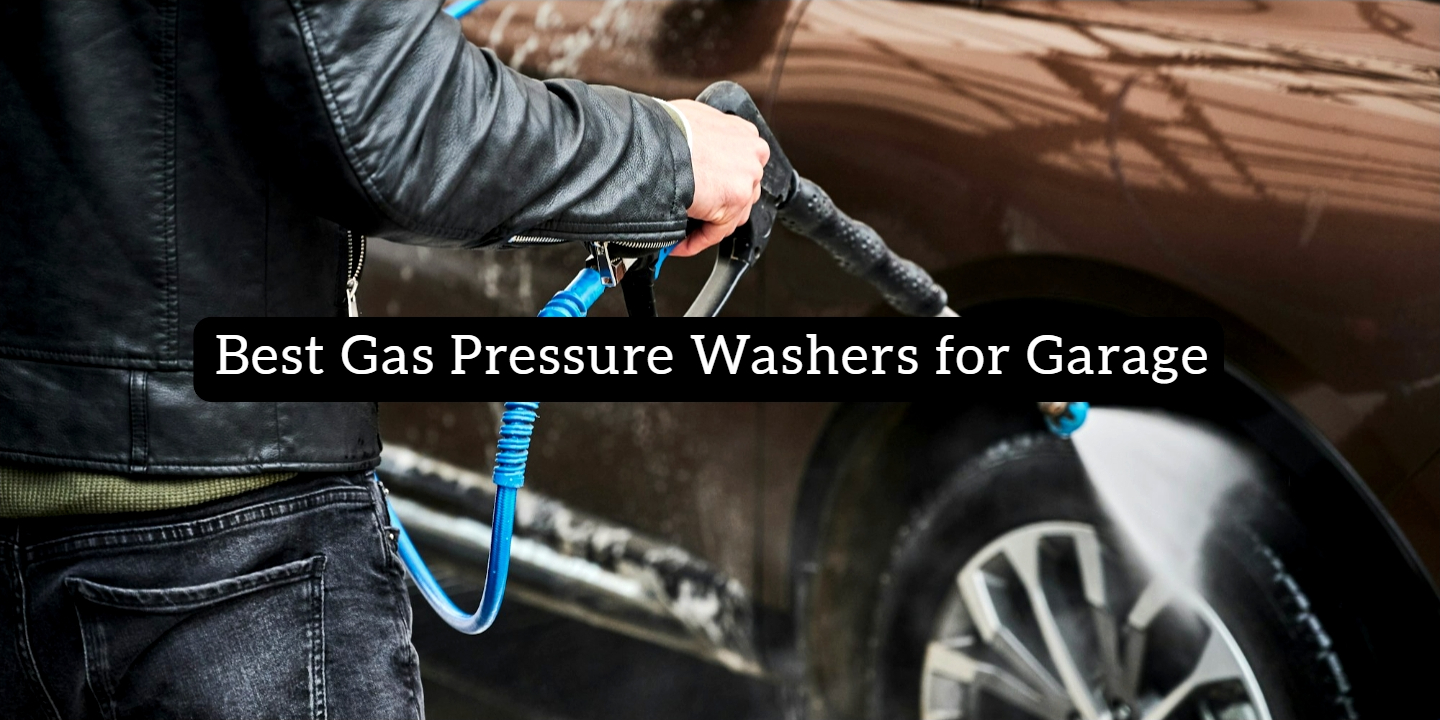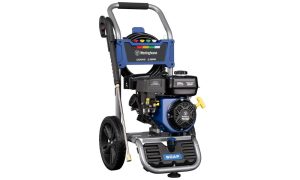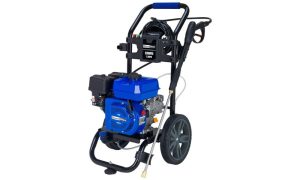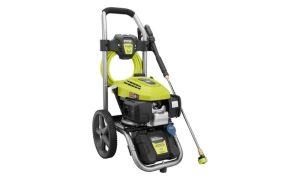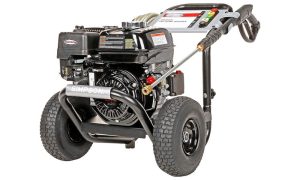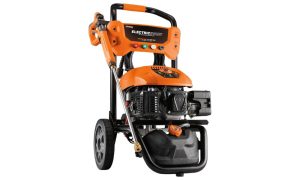Let’s face it, it can also become a grime magnet, collecting dust, dirt, and stubborn stains over time. How could you deal with it?
Well, we’ve rounded up the best gas pressure washers for a garage you could try. Pressure washers are heavy-duty machines, ready to blast away even the most stubborn garage gunk.
Whether you wanna do some light cleaning or need an industrial-grade muscle, there’s a model for everyone. We’ll delve into all the important aspects to help pick a suitable one. Let’s get into it!
Westinghouse Gas Pressure Washer
This model delivers impressive cleaning power at an affordable price. It has 200 PSI and 2.5 GPM, tackling tough grime on concrete, siding, and even your car with ease. It can even deal with years of caked-on dirt in your garage. Plus, its CARB-compliant design minimizes harmful emissions.
Pros:
- Performance: Blast away tough grime with 3,200 PSI and 2.5 GPM, making even the dirtiest jobs a breeze.
- Low-cost: An attractive price point compared to high-end models.
- Eco-Conscious: CARB-compliant design minimizes harmful emissions for a greener clean.
- User-Friendly: Easy to start, large fuel tank and minimal assembly make it convenient to use.
Cons:
- Noise: Prepare for noise during operation, it’s not the quietest option.
- Heat: Certain parts can get hot during use, be mindful when touching during operation.
- Size: Not exactly compact, make sure you have storage space before buying.
- Vibrations: These can be intense, consider an electric model if sensitivity is a concern.
Think Twice:
- Noise is a concern: It packs a decibel punch. Prepare for some noise during your cleaning marathon.
- You’re short on space: Don’t underestimate its size. It isn’t exactly compact, so make sure you have dedicated space.
- Sensitivity is a concern: If you have concerns about hand fatigue or sensitivity, consider an electric alternative.
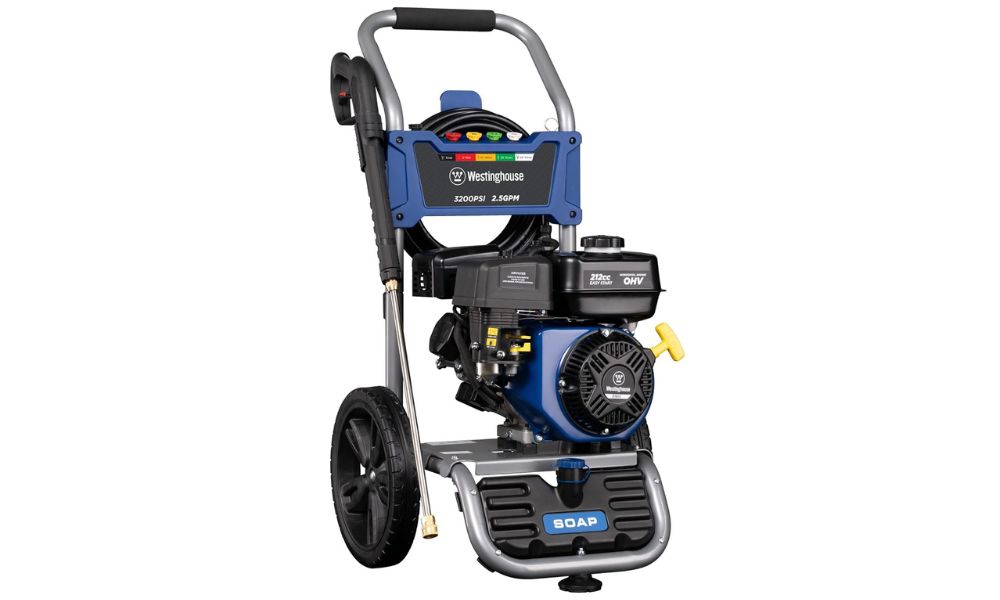
You may also like: 7 Best Garage Vacuum Systems Reviews
Duromax Gas Engine Pressure Washer
This one shines for tackling light and medium-duty cleaning tasks. But don’t underestimate this “light-duty” label. Packing 2,700 PSI and 2.3 GPM, it tackles messes on cars, grills, windows, and patio furniture without the worry of damage.
Pros:
- Light-duty: A gem for cleaning cars, furniture, and grills with 2,700 PSI and 2.3 GPM.
- Low-cost: An inexpensive option compared to high-end pressure washers.
- Versatility: Five quick-connect nozzles tackle different cleaning needs.
- Convenience: A built-in detergent reservoir saves time and effort.
- No Cord: Gas-powered design eliminates the need for extension cords.
Cons:
- Not for heavy-duty: Not ideal for tough cleaning jobs or large areas.
- Plastic parts: Durability might be a question mark for some.
- Noise: Gas-powered operation means expect some rumble.
Think Twice:
- Heavy-duty projects are your Jam: It might falter against heavy-duty messes like caked-on concrete grime or extensive driveway cleaning. Look for higher PSI if that’s your reality.
- Durability doubters: Some plastic parts raise concerns about long-term wear and tear.
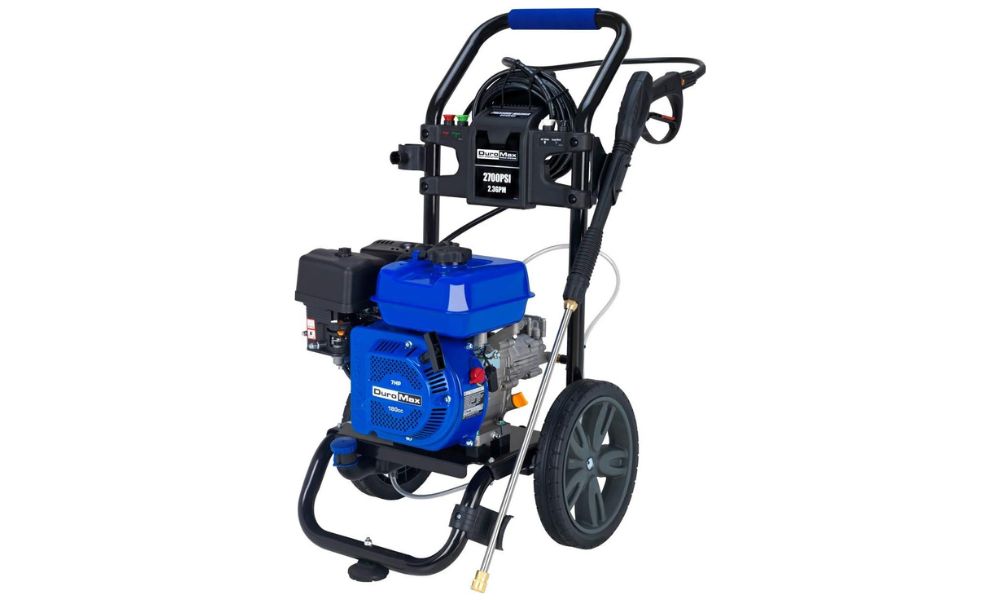
RYOBI Cold Water Gas Pressure Washer
Here’s a model that boasts 3100 PSI, cleaning twice as fast as its electric counterparts. It lets you blast away stubborn grime on driveways, decks, and even paint-resistant surfaces with ease. The dependable Honda engine provides reliable performance for those who trust the brand, too.
Pros:
- Power: 3100 PSI tackles tough cleaning jobs twice as fast as electric models.
- Cordless: No more extension cord limitations, clean wherever you need.
- Honda: Dependable Honda engine for peace of mind and performance.
- Features: Oversized wheels, a long hose, good storage, and long warranty.
Cons:
- Noise: Prepare for engine noise during operation.
- Maintenance: Requires fuel, oil changes, and proper storage.
- Environmental Footprint: Emits fumes and requires fuel storage and disposal.
- Expensive Attachments: The 5-in-1 nozzle, while convenient, is pricey and prone to rusting.
Think Twice:
- Quiet is paramount: Gas operation means noise, and this model is no exception.
- Low maintenance is a must: Such washers require fuel, oil changes, and proper storage.
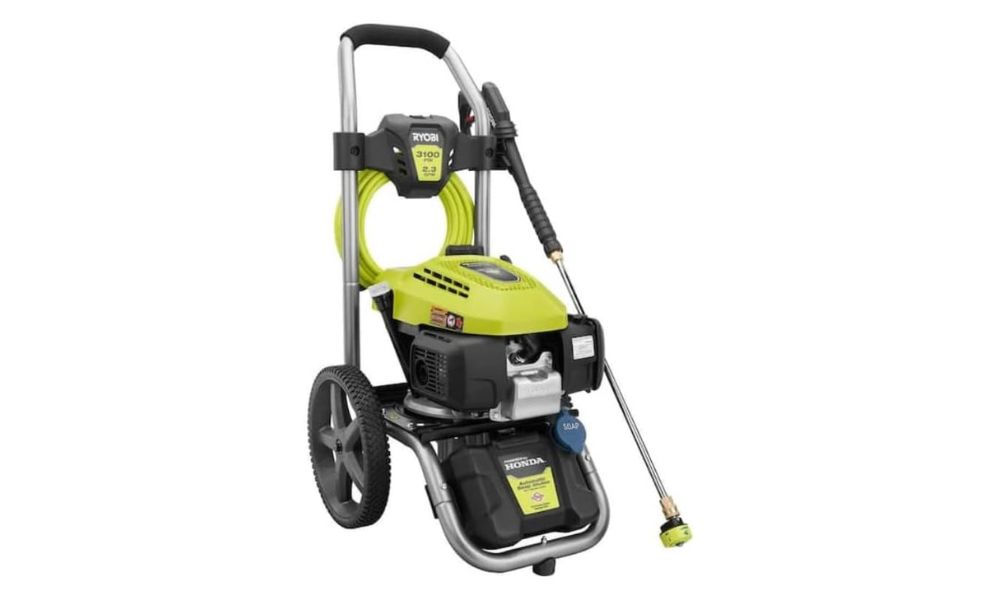
Check also: 7 Best Garage Concrete Floor Cleaners
Generac Gas Powered Residential Pressure Washer
This washer thrives on light-to-medium duty tasks like washing your car, patio furniture, or siding. Many users rave about the straightforward assembly process, making it easy to get started quickly. Bonus points for not requiring ground-level hose connections!
Pros:
- Simple: Straightforward assembly and user-friendly operation get you cleaning in no time.
- Detergent: The built-in detergent tank simplifies soap application.
- Pressure Control: The PowerDial on the spray gun allows for effortless pressure adjustments.
- Low-cost: An attractive price tag makes it a good option for value-conscious buyers.
Cons:
- Power Underdog: Lowest PSI and GPM in its category, limiting its cleaning potential for tough jobs.
- Terrain Test: Maneuverability on uneven surfaces might be a challenge.
- Durability: Some concerns about design and missing parts raise durability questions.
Think Twice:
- Power: The 3,100 PSI and 2.4 GPM flow rate are the lowest on the block. If heavy-duty cleaning like driveways or tackling tough grime is your goal, look for higher specs.
- Terrain Tamers: Some report difficulty maneuvering on uneven surfaces.
- Durability: Some mention concerns about the missing parts.
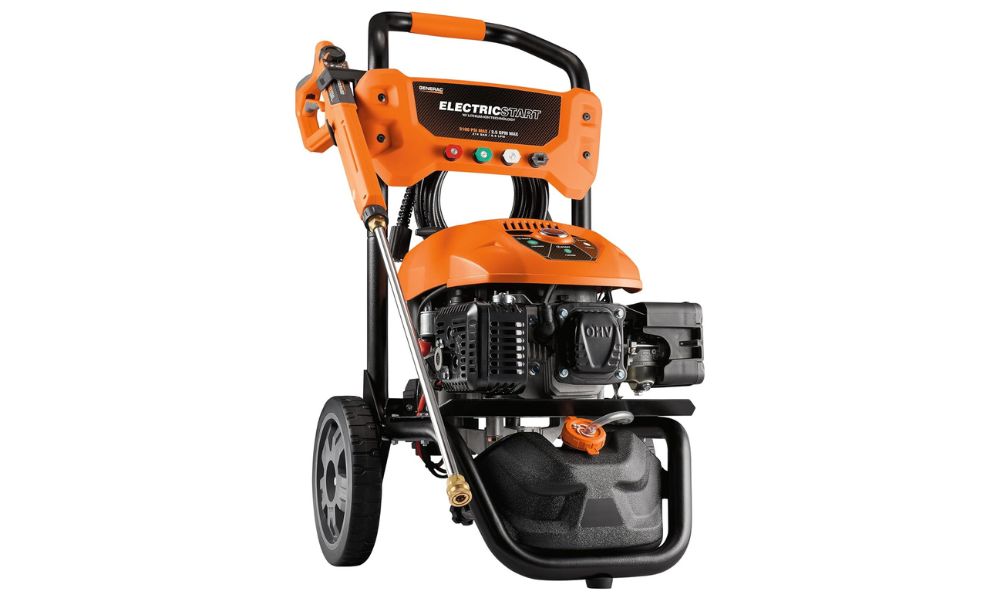
SIMPSON PowerShot Gas Pressure Washer
Conquering heavy-duty cleaning challenges like peeling paint and algae-infested walls? This beast boasts a whopping 4,000 PSI and 3.5 GPM, effortlessly conquering even the most stubborn grime. And the 50-foot hose, twice the length of most models, grants you unmatched cleaning freedom, too.
Pros:
- Power: 4,000 PSI and 3.5 GPM tackle the toughest cleaning jobs with ease.
- Honda: Premium Honda engine ensures low maintenance and optimal performance.
- PowerBoost: Delivers even higher pressure at the nozzle for maximum cleaning efficiency.
- Reach for the Stars: A 50-foot hose eliminates frequent re-positioning, ideal for large areas.
Cons:
- Bulk & Brawn: Heavier and bulkier than some models, limiting maneuverability.
- No Detergent Dispenser: Requires separate detergent application, less convenient for some users.
- Price Tag: Powerful performance comes at a higher cost compared to some options.
Think Twice:
- Mobility: Its size and weight might not be ideal for those who prioritize maneuverability.
- Detergent Devotees: It doesn’t have a built-in detergent tank.
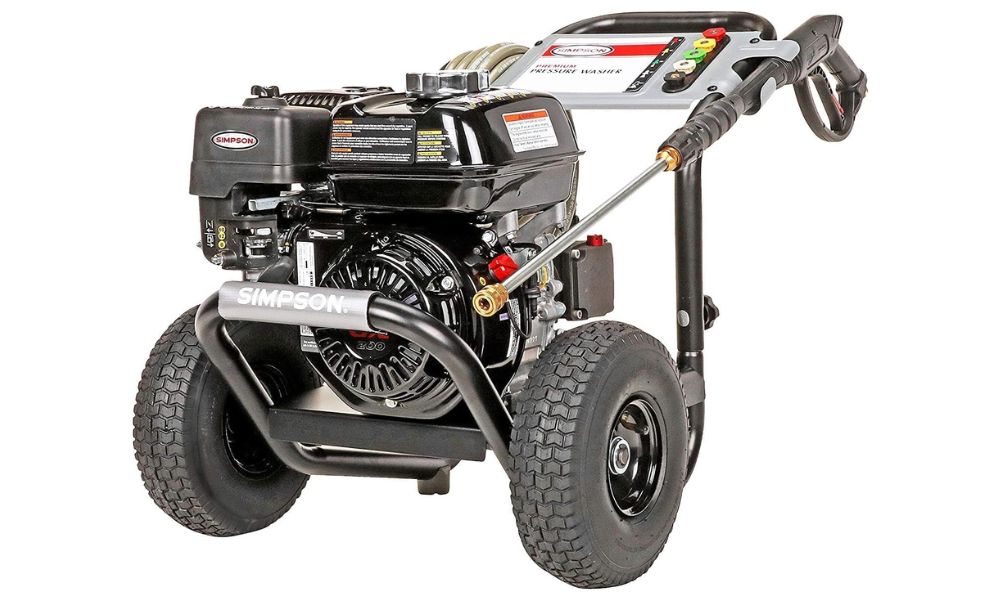
Have a look at: 8 Best Car Vacuum Cleaners
DEWALT Cold Water Gas Pressure Washer With Honda Engine
If your garage has stained concrete caked-on grime or even some old gravity you’d like to remove, this model is for you. Does everyone need it? No, of course not. But it’s great if you’re dealing with serious cleaning tasks. Its power handles tasks that would overwhelm standard ones.
Pros:
- Power: 4,400 PSI and 4 GPM tackle professional-grade cleaning jobs with ease.
- Performance: Durable construction and Honda engine ensure long-lasting reliability.
- Maneuverable: Despite its weight, wheels make it easy to move around work areas.
- Accessories: Steel-braided hose and quick-connect nozzles offer durability and convenience.
Cons:
- Pricey: The professional-grade performance comes at a premium price tag.
- Setup: Assembly might be challenging for users who prefer simpler processes.
- No Detergent on Board: Requires separate application of detergent, less convenient for some users.
Think Twice:
- DIY Dabblers: It might be overkill for occasional light-duty cleaning around the house.
- Assembly Aficionados: Reviews mention a somewhat complicated assembly process.
- Detergent Devotees: It lacks an onboard detergent tank, requiring a separate application.
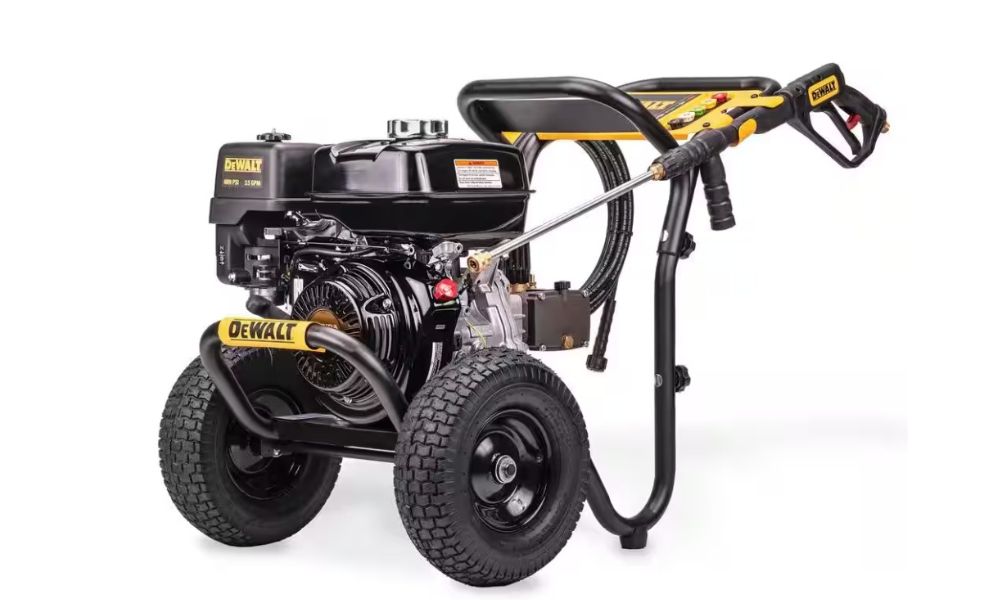
You may also check: How To Clean Oil Off Garage Floor (All Floor Types)
SIMPSON Megashot Residential Gas Pressure Washer
This one is a gem for those who would like a mix of power and portability. It tackles most cleaning tasks, from decks and patios to vehicles and siding. Plus, the compact design and pneumatic tires make it easy to maneuver around. And five quick-connect nozzles let you deal with a vast scope of tasks, too.
Pros:
- Power: 3,200 PSI tackles most outdoor cleaning tasks effectively.
- Portable: Compact design and pneumatic tires offer easy maneuverability.
- Performance: The Honda engine and factory testing ensure reliability and quality.
- Versatility: 5 attachments provide options for various cleaning needs.
- Extras: Includes oil and siphon tube for the engine, saving you time and hassle.
Cons:
- Noise Factor: Gas-powered operation makes it louder than some models.
- Detergent: Lacks the convenience of a separate detergent tank.
- Price: Might not be the most budget-friendly option.
Think Twice:
- Convenience Crusaders: While it has a detergent hose, some prefer the ease of a separate detergent container for faster refills and less mess.
- Budget Watchers: Its price tag might be higher than some users are willing to spend.
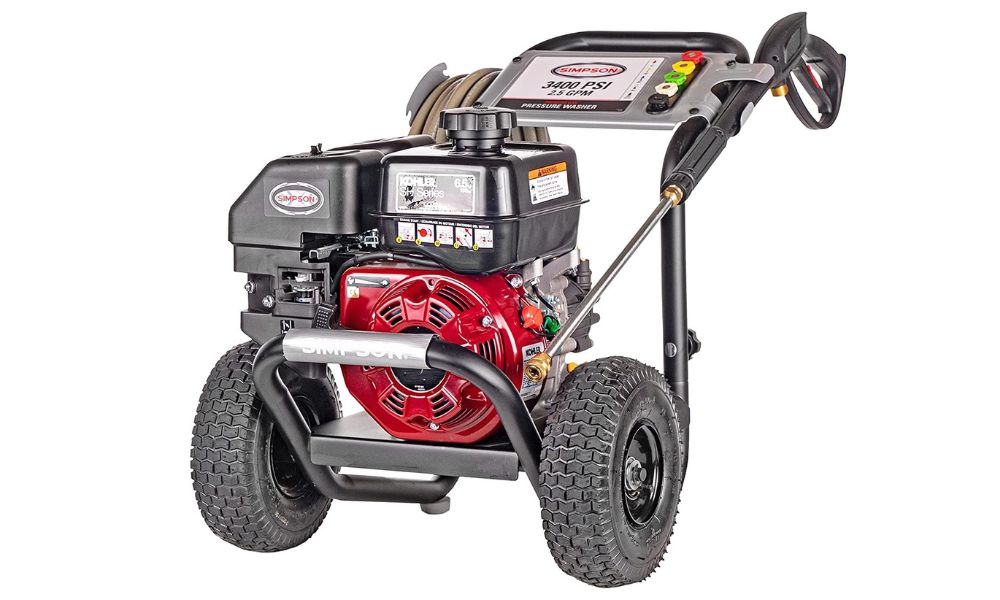
FAQ
Is It Ok To Pressure Wash Your Garage?
Absolutely! Pressure washing is a fantastic way to clean your garage floor, walls, and even your driveway. It blasts away dirt, grime, oil stains, and other stubborn messes, leaving your garage looking refreshed and revitalized.
However, proceed with caution and use the right techniques to avoid damage. Always be sure to:
- Use a fan nozzle. This spreads the water pressure evenly and prevents concentrated blasts that can etch the surface.
- Start with lower pressure and work your way up.
- Test a small area first to ensure you’re comfortable with the results.
What Kind Of Gas Does A Pressure Washer Use?
Most gas pressure washers use unleaded gasoline with an octane rating of 87 or higher.
Always refer to your owner’s manual for the specific fuel requirements of your model. Remember to store gasoline safely in a designated container and follow proper handling practices.
Can You Store A Pressure Washer With Gas In It?
Not for long-term storage. Gas can start to degrade after 30 days, potentially damaging engine components.
If possible, drain the remaining fuel into an approved container before storing your pressure washer. This simple step can save you headaches down the line.
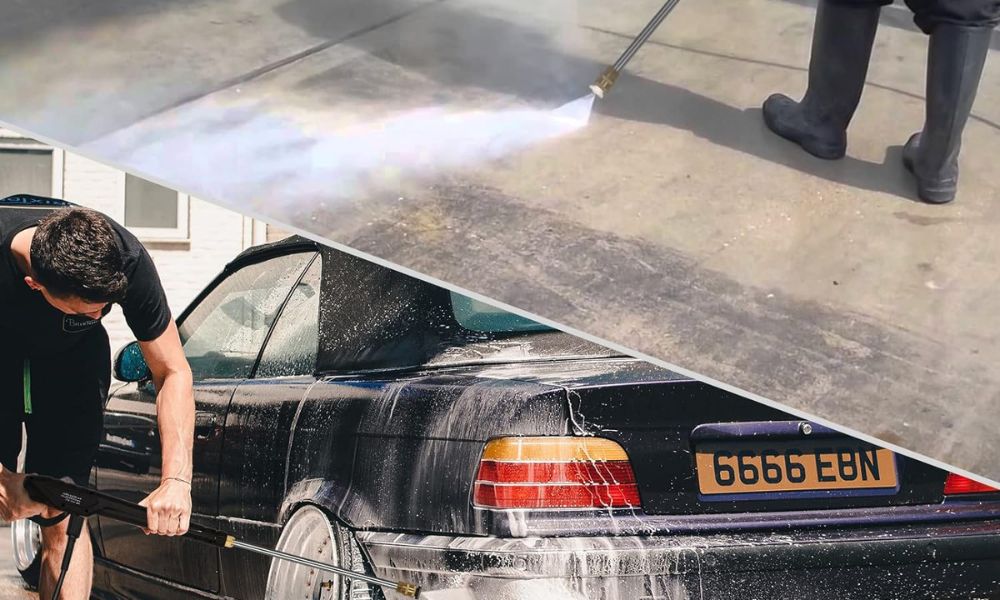
What PSI Pressure Washer For Garage Floor?
For a standard concrete garage floor, a pressure washer with 2,000-3,000 PSI is ideal.
Higher PSI might be unnecessary and could damage the surface. Always test in an inconspicuous area first. And remember, PSI isn’t everything; consider the GPM (gallons per minute) for water flow rate too.
Consider:
- Heavier grime or oil stains: 3,000 PSI might be better.
- Delicate surfaces or cracks: Stick to 2,000 PSI or even lower.
How Long Can You Continuously Run A Gas Pressure Washer?
Most of these can run continuously for 30-45 mins. However, this is just a starting point, and exceeding it can lead to overheating and damage.
Signs Your Pressure Washer Needs a Break:
- Decreased water pressure: This indicates the engine is struggling to keep up.
- Unusual noises or vibrations: Listen for anything out of the ordinary.
- Hot engine: Touch the engine carefully (avoid moving parts!). Too hot is a no-go.
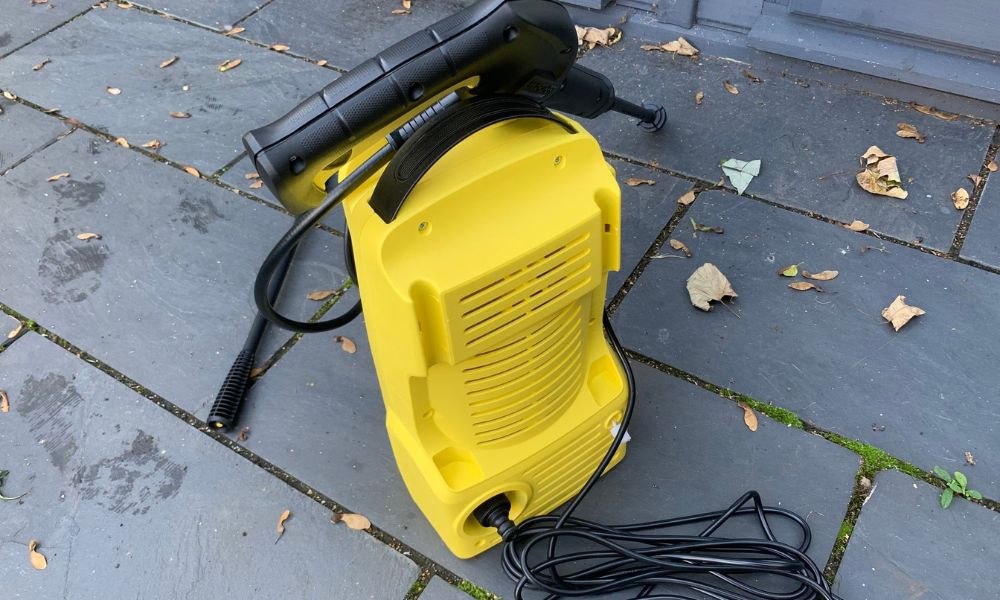
How Often Should You Pressure Wash Your Garage?
It depends on usage and climate. A good rule of thumb is to pressure wash your garage floor once or twice a year, and more often if you use it for messy projects or store vehicles inside.
Does Pressure Washing Damage Concrete?
Used incorrectly, yes. High pressure or improper technique can etch or damage concrete. Follow the PSI range for your surface and use a fan nozzle to spread the force evenly.
Where Should You Not Use A Pressure Washer?
Avoid using them on:
- Painted surfaces: The force can chip or peel paint.
- Windows or glass: The force can crack or shatter them.
- Electrical wiring or outlets: Water and electricity don’t mix!
- Softwoods or delicate plants: It can damage them.
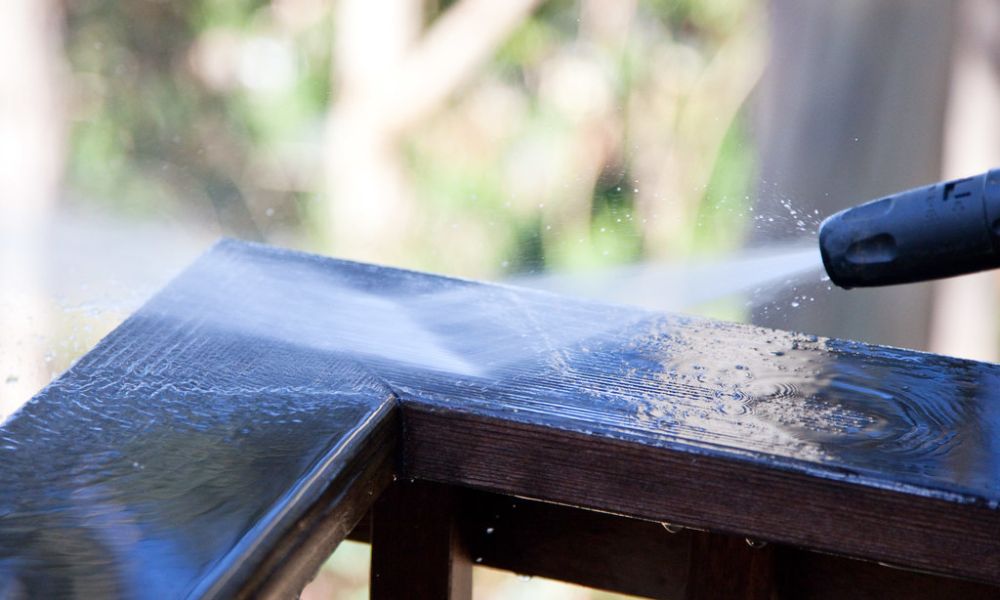
What Are The Disadvantages Of A Gas Pressure Washer?
- Noise: These are louder than electric ones.
- Maintenance: They require regular oil changes and other maintenance.
- Emissions: They contribute to air pollution.
- Price: They are generally more expensive than electric models.

